|
It’s 55 years since Australia’s Arbitration Commission granted women the right to the same pay for the same work as men. During that time the gap between average female and male pay has narrowed, but still remains somewhere between 12% and 21%.
Today, on International Women’s Day, Lisa Heap raises the prospect of a big leap forward this year.
She details the extensive new powers and responsibilities given to the Fair Work Commission in 2022, and says this is the first year it will really be able to test them out.
If the commission is bold enough, it could move towards eliminating the gender pay gap by the end of the year.
One test will be a case currently before the commission, concerning pay for care workers. Another will be the national wage case, which will be decided by June.
Meanwhile, and even though it’s 2024, political power in Australia still looks very much like a man. Intifar Chowdhury has crunched the numbers from the most recent Australian Electoral Study, finding there are still significant gender gaps in political attitudes and behaviours across generations.
But there is a glimmer of hope, she writes – and perhaps surprisingly, it’s to be found on social media, where young women have been challenging the established political order by getting involved in politics online.
|

|
Matthew Hall
Editor
|
|

Lisa Heap, RMIT University
The Fair Work Commission has been given new tools. Among them is the power to eliminate gender-based undervaluation of work in entire awards and groups of awards.
|
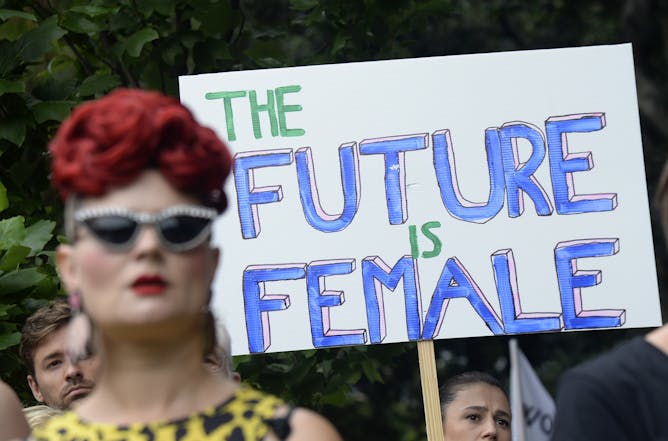
Intifar Chowdhury, Flinders University
Data show young Australian women are less politically engaged than men. Given the negative experiences of female politicians, that’s hardly surprising. But there’s a glimmer of hope.
|
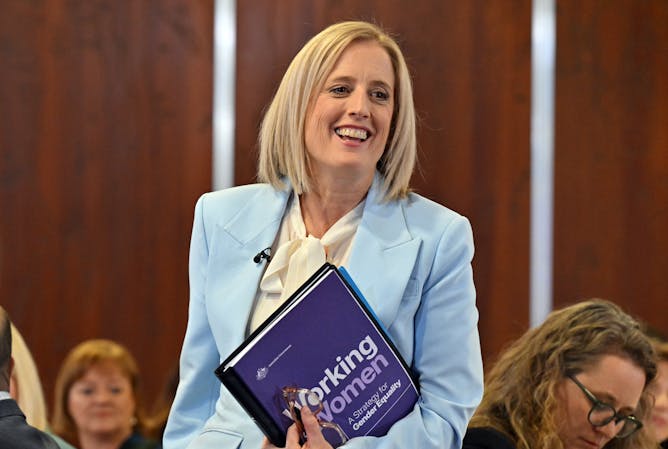
Susan Harris Rimmer, Griffith University
While there is much to applaud in the government’s strategy, it neglects to deal with the unequal gender impacts of climate change.
|
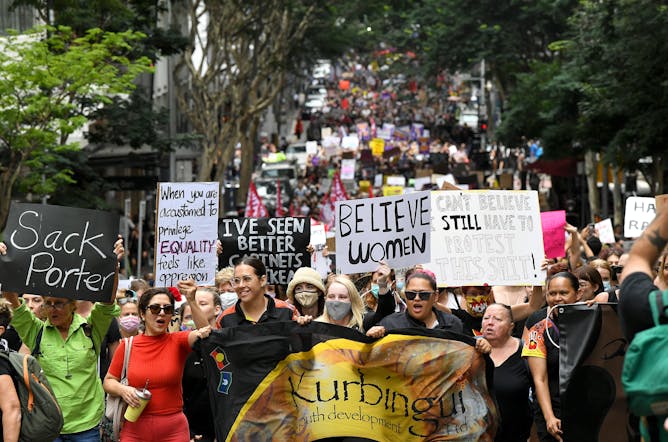
Sharon Crozier-De Rosa, University of Wollongong
We’re used to describing feminism in ‘waves’, from the first in 1848, campaigning for women to vote, to the current fourth wave, in the age of #metoo. But do waves still work to describe feminism?
|

Lea Redfern, University of Sydney
Feminist podcasts are having a moment. An expert reflects on 12 of them, from The Guilty Feminist and Feminist Book Club to podcasts that explore women’s lives and stories.
|

Michelle Grattan, University of Canberra
If Jim Chalmers were in television, he’d be the presenter, key producer and the warm-up act. The Budget might be two months away, but Chalmers is preparing us for his night in the spotlight.
|

Ty Ferguson, University of South Australia; Carol Maher, University of South Australia; Rachel Curtis, University of South Australia
The Fair Work Commission is considering basic rights to work from home. Here’s what the evidence says about the impacts of working from home on physical health and mental wellbeing.
|

Thomas Sigler, The University of Queensland; Zhenpeng (Frank) Zou, The University of Queensland
The number of active short-term rental listings is a small fraction of the total number of dwellings in Australia – and many listings are not in the city areas of great housing need.
|

Brittany Finucci, National Institute of Water and Atmospheric Research; Cassandra Rigby, James Cook University
Long lifespans and slow reproduction rates make deep-water sharks and rays as vulnerable to overexploitation as whales once were. We must place them under protection to avoid extinctions.
|
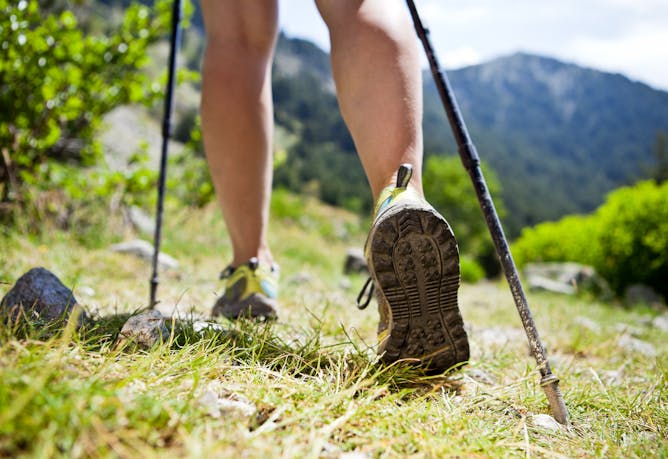
Matthew Davidson, University of Sydney
Psychology researchers have used virtual reality to find our brains oscillate with each step – an intriguing finding to better understand how we see the world.
|
Politics + Society
|
-
Peter Thompson, Te Herenga Waka — Victoria University of Wellington
Calls for the Fair News Digital Bargaining Bill to be fast-tracked are misguided. A better solution would be a straight levy on digital advertising to fund public interest news production.
-
Rebecca Strating, La Trobe University
Southeast Asian leaders have made clear their priorities this week. Some want more focus on climate change than geopolitical competition.
|
|
Health + Medicine
|
-
Christopher Blyth, The University of Western Australia; Allen Cheng, Monash University
The RSV shot children in WA will get is a monoclonal antibody. Here’s what that means.
|
|
Environment + Energy
|
-
Martina Linnenluecke, University of Technology Sydney
Will it make a difference when companies have to track and report emissions and environmental impact? Only if policies with teeth follow.
|
|
Arts + Culture
|
-
Ari Mattes, University of Notre Dame Australia
This year’s picks reflect what most cinephiles already know: streaming is the last nail in the coffin in the shift away from cinema to television.
|
|
| |
|
|
|
Aeon Media Group Ltd
Melbourne VIC, Australia
•
Full Time
|

|
|
The Conversation AU
Melbourne VIC, Australia
•
Full Time
|

|
|
|
|
| |
| |
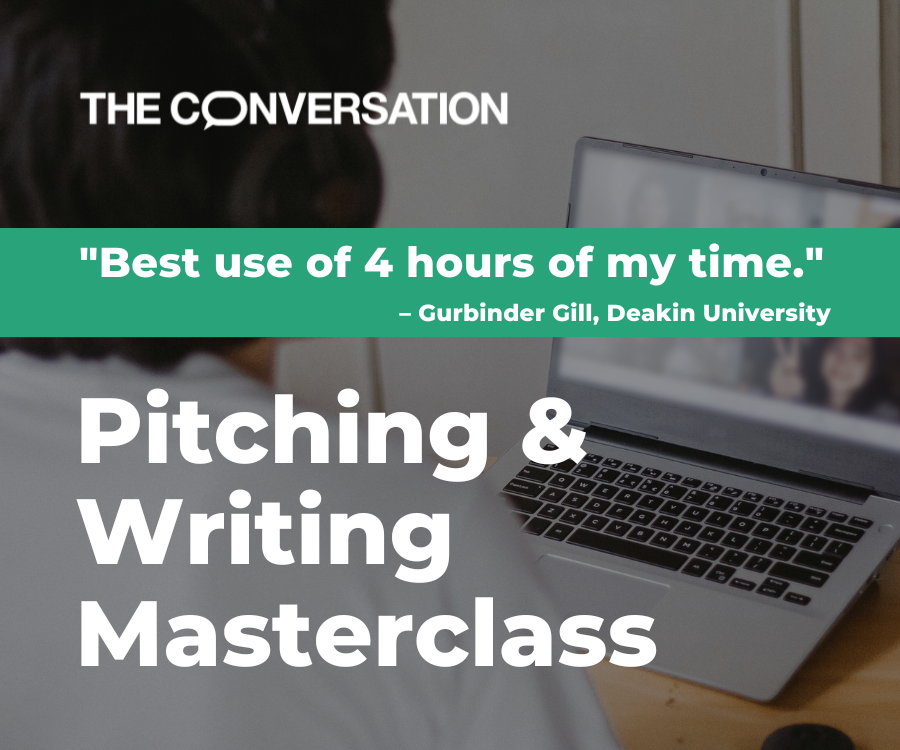
|
| |
| |
| |
Featured Events, Courses & Podcasts
|
View all
|
|
1 January 2023 - 7 October 2026
•
|

|
1 February 2023 - 25 November 2029
•
|

|
14 March - 12 April 2024
•
Sydney
|

|
21 March 2024
•
Online and Hobart
|

|
|
|
|
| |
| |
| |
| |
| |
|
|